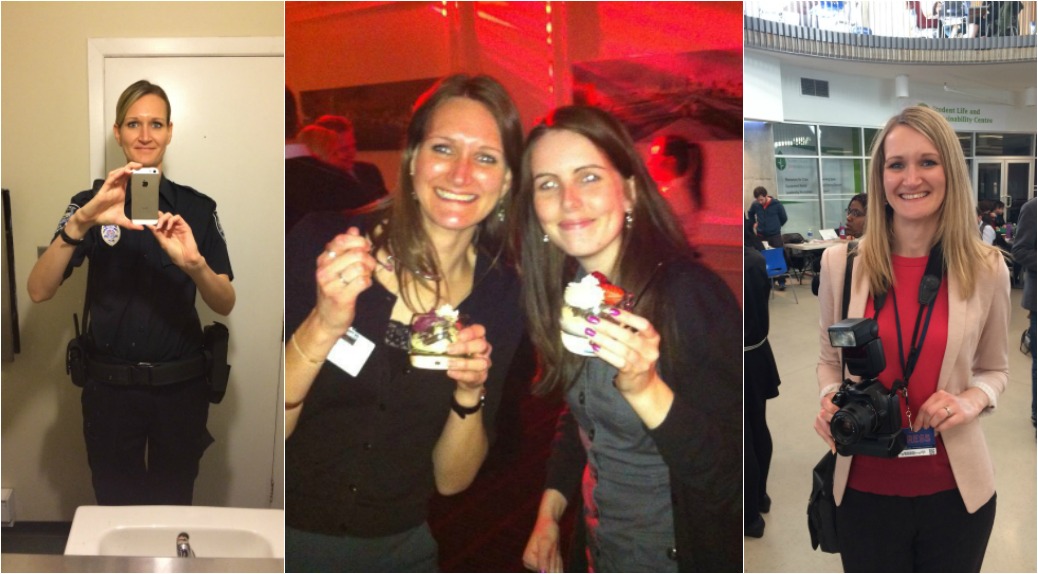
(This is just one! of many! interviews with people I know who have amazing, envy-inducing jobs. I met Andrea through the wonder of the interwebz. Not only can she rock a vintage dress like nobody’s business, she’s a blogger extraordinaire and an author to boot! Gosh! I’d be happy with two out of those three!)
I write novels! I had a children’s book published in 2002 – a fantasy novel for ages 9 to 12 – and now I’m trying to get an adult’s novel published. But since I can’t support myself doing just that at the moment, I also work as a freelance writer and editor.Tell us about an average day in book-writing.
I drink two cups of coffee. I procrastinate for half an hour. I put another pot of coffee on. After waiting in vain for some kind of natural disaster, I get down to work at about 9am. I work best within a strict routine, so I’m chained to the desk for at least four or five hours every day. Essentially my day involves lots of caffeine and lots of staring at a computer screen. As well as working on a new book, I’m usually in the process of editing an old one at the same time, and sending out queries to literary agents by post and email.
I try to write 2,000 words a day when I’m writing a first draft. It’s a little more variable when I’m editing or rewriting.
Did you go to school for this? Or get any special training?
If you want to be a writer, write. It’s good advice. I have been writing since I knew that the black, squiggly shapes were letters. To me, that’s more important than formal qualifications, but I did do a BA degree in English and took all the university writing classes I could. I worked as the editor of a magazine for a while after university, then did a post-grad diploma in book publishing, and now I’m finishing up a MFA programme in Creative Writing. I don’t think any of those things are necessary if you want to be a writer, but they were all helpful in different ways – particularly the MFA programme. If you’re really serious about fiction writing as a career, it’s a good path to take.
How did you get into this line of work?
It’s the only thing I’ve ever been really good at, and it’s all I’ve ever wanted to do. I suppose it was a combination of that certainty, bloody-mindedness, blind optimism and the willingness to not earn very much money.
Are there any drawbacks to working in this field?
The aforesaid lack of money! It is unlikely you’ll earn very much from being a writer, unless you’re one of the 0.0001% who write a bestseller. It is also a very difficult field to break into. Finding an agent and a publisher is a Herculean task, and receiving all those inevitable rejections is emotionally quite hard. The average published author receives around 120 rejections before she is successful. You have to be prepared to hear 120 people telling you ‘no’ before you get one ‘yes’. Working as a writer also means you will need a ‘day job’, unless you’re very lucky. You have to fit writing time around your other commitments and responsibilities.
Oh yes, and the postage costs are horrific. Sending a 400-page manuscript through the mail is very painful for the wallet.
What are the highlights?
There’s nothing better than doing what you love. Nothing at all. I’m lucky to work in a job that feeds my soul every day – even on the bad days.
Are there any misconceptions about working in this field?
Many. One is that it’s easy to write a book. It’s not. Another is the misconception that if your book is good enough, you won’t have a problem getting it published. Again, not true. It’s a complex industry, and publication relies on the opinions of many different people who all have very different ideas. It’s tough to break into.
Working in any artistic field, there is also a chance that people will label you as an ‘artist’ in a negative way. Here are some of the terms I have heard associated with ‘artist’: temperamental, prima donna, drama queen (or king!), unreliable, starving, over-emotional, arrogant, selfish, waster. Of course, these terms hardly ever apply to the real people we call artists, but that stereotype is quite a powerful one.
What suggestions would you give to people interested in getting into this?
Write, write, write. Take all the classes you can, enter all the competitions you can, submit to all the literary journals you can. But most of all, write. Watch the word count mount up every day. Plunge right in, do something ambitious and keep plodding away until you’re finished. It’s the best way to learn.
Once you have a completed novel, edit it until you’re blue in the face. One of the best ways to start is by reading the whole thing aloud, in its entirety. This will show you any problems with the flow. And do a really anal copyedit. Once you’ve done all that, show it to someone with expertise in the area, someone you trust, and get their thoughts, and edit it again. You really can’t go over it too often. Once you’re relatively happy with it (and it will never be perfect), you need to write a query letter, research agents and start sending out queries. I wrote a post on this process.
And good luck! It’s a long, difficult process, but it’s also hugely rewarding and fun.
Are any of you harboring visions of books with your name at the bottom? Any questions for Andrea?













No, but I’m harboring visions of a book with my name at the TOP. 🙂 I just wanted to say, this article is great! Writing is hard as crap, and I think the only reason I haven’t actually started a book is because I’m lazy. There. I said it. Sometimes I think that some books only get published because one author was willing to work harder than another.
Thanks again for this article…good stuff!
Yay! I adore Andrea and am tickled to see her thoughts on authordom in this condensed form.
ooh i think being an author would be so fun and rewarding – not to gloss over the hard work it must be! what a cool job 🙂
I hope to one day write books. Right now I’m content writing articles and short stories, but I always always have a few novel and non-fiction ideas rolling around in my head. Also the boy is a (as yet un-book-published) author, so it doesn’t help the wanting much.
Thanks for your words Andrea!
What would you say are the main things to consider when begining a new book? What have you found to be the best way of outlining a plot for something as ambitious as an entire novel? Do you even outline the plot first, or do you just channel some divine goddess of bookdom? Best of luck on your new endeavor.
Thanks for featuring me, Sarah! 😀 Sorry it has taken me so long to say so, I’m crazily behind on all things bloggy with this stupid illness.
Kitty: I guess the main thing to consider is, do you really care about your story? Writing a novel is a long process. You have to spend a lot of time with your story and characters, and sometimes you will want to douse them in gasoline and set fire to them. Make sure you are passionate enough about your story that you can survive the hard times. Kind of like a marriage. 😉
In regards to outlining – I don’t really do it before I write. I write a lot of notes, but not a complete outline as such. Most of my structured outlining comes after I’ve finished the first draft, when I’m revising and shaping the lump of clay into something that makes sense. So I guess I’d have to say divine goddess of bookdom (I picture her as a kind of Carmen Miranda figure with a fruit hat) first, followed by outlining! 🙂
Thank you,
A xx